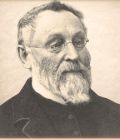Inflammation and suppuration of the inguinal glands (D.).
Epilepsy recurring at night, with aura, beginning in the solar plexus (D.).
Chronic gonorrhoea with thick fetid discharge (Hyoscyamus, Nat-S., Pulsatilla) (Br.).
Itching and swelling of the scrotum (Graphites, Rhus toxicodendron, Sulphur) (R.).
Violent erections (Cantharis, Phosphorus, Sulphur) (R.).
Seminal emission at night (Nux vomica, Acid phosphoricum.) (R.).
Hydrocele (Apis, Pulsatilla, Sulphur) (Br.).
Elephantiasis of the scrotum (Br.).
AGGRAVATION :
From cold; during menses; at new moon; from uncovering, especially the head; from lying down; after vaccination; from a draught; from motion; in the open air; at night.
AMELIORATION:
From warmth, especially from wrapping up the head; in a warm room; from magnetism and electricity.
RELATIONSHIP:
complementary: Fluor-Ac., Sanicula and Thuja
Compare: Bar-C., Calcarea, Calcarea phos., Dios, Ferrum, Gettys-burg, Graphites, Hepar, Hypericum, Iodium, Kali-P., Lycopodium, Mercurius, Natrum muriaticum, Nat-S., Opium, Petroleum, Phosphorus, Pic-Ac., Pulsatilla, Ruta, Sanicula, Sepia, Sulphur, Thuja, Veratrum
Follows well after: Calcarea, Graphites, Hepar, Acid nitricum, Phosphorus
Is followed well by: Fluor-Ac., Hepar, Lycopodium, and Sepia
Silicea he chronic of Pulsatilla
Mercurius should not be given before or after Silicea
Its action is deep and long-lasting.
Difference between Silicea and Calcarea sulph., i n suppurative process:- Silicea promotes suppuration and brings the suppurative process to maturity. Calc-Sulph. cheeks suppuration and promotes healthy granulation.

